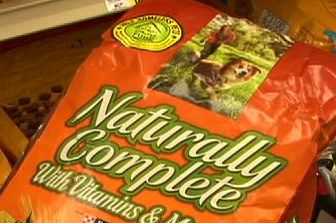Pet Food Marketing Is Confusing and Misleading

We all want to find the freshest ingredients and highest quality foods when preparing meals for our families. It’s also likely that we want the best food for our pets too.
You’ve probably heard the terms “natural”, “organic” or even “human-grade” when referring to pet food. But what do they actually mean?
The pet food market has become extremely competitive and very confusing. More than 3,000 different brands of food sit on store shelves and highly paid, successful ad agencies are often recruited to find ways to convince pet owners that their particular brand is the very best.
Much of this marketing uses the term “natural” and other key words that are really designed just to motivate you. Much of it has little to do with the quality of the food. In fact, according to PetfoodIndustry.com, the “natural” pet products market in the US is expected to double to more than $9 billion by 2017.
So, do any of these marketing buzz-words have actual significance?
According to the Association of American Feed Control Officials (AAFCO), the term “natural” does have legal meaning. The FDA, who actually has authority over pet food manufacturing and label claims, does not give a definition to “natural” but has not objected to its use as long as the foods do not contain artificial flavors, added colors or synthetic substances.
Like “natural”, the word “organic” also has been legally defined. Pet foods and treats that wish to be labeled as organic must meet standards set forth by the National Organic Program. These requirements include both how the food is grown as well as how it is handled. Additionally, organic livestock must have access to the outdoors and no antibiotics or growth hormones can be given.
But, please remember this, despite modern folklore and Internet rumors, organically grown foods have not been shown to be superior in either nutrition or health. It has become one of those huge marketing gimmicks used to motivate you to buy something that may or may not be good for your pet family members.
The use of the term “natural” also does not always mean healthy or even safe. A prime case in point is a naturally occurring mycotoxin known as Aflatoxin that can cause serious liver disease in dogs and occasionally sparks pet food recalls, many of these brands are labeled “natural”.
Unfortunately, many pet owners are swayed by other labels and none of them has a legally defined meaning. One of the worst offenders is the use of the term “human grade” or “human quality”. A pet food company that markets this way is implying that their pet food is edible for people. AAFCO has stated that using these terms without meeting all federal regulations is a misbranding of the product. This is government-speak for mis-leading, some would call it fraud.
When you see the term “human-grade” in marketing or on bags of foods, remember that this term has no significant meaning for pet diets.
So, what about all these marketing gimmicks? Can you always trust foods sold as “premium”, “holistic” or even “gourmet”? It’s important to remember that all of this promotion is designed for your benefit, not your pets. How do we choose correctly, safely and also economically?
First, find a food that has undergone AAFCO feeding trials. This statement can be found on the bag’s label and assures you that the food is digestible, palatable and that your pets can successfully use the nutrients in the food. Next, look at the price. If you are paying less than a dollar per pound of food, that diet won’t work. You will end up feeding more just to meet your pet’s energy and nutritional requirements. Look for a food that costs around $1-2 per pound.
Finally, ask your veterinary team about the reputations of pet food companies and for their recommendations. After all, who knows your pet and their needs better?
As you can see, it’s easy to become confused when the Madison Avenue ad agencies start working their magic. Your veterinarian and their staff will often have some sound advice concerning pet nutrition. Better yet, it will often come without all the marketing hype! The relationship between you and your pets is personal, and the relationship you have with your veterinarian is personal. Rely on that, not on the impersonal decisions made in a board room.


